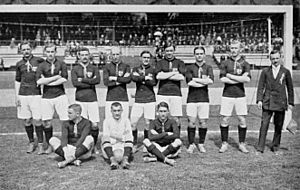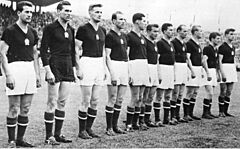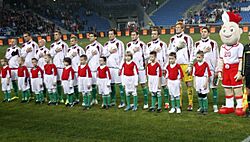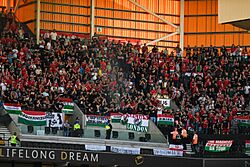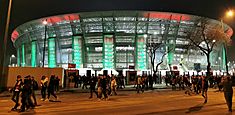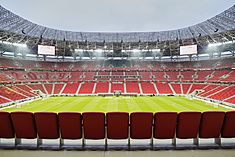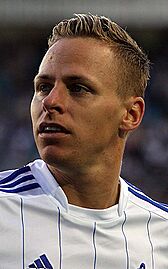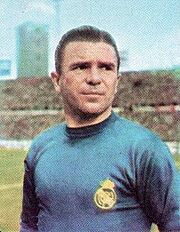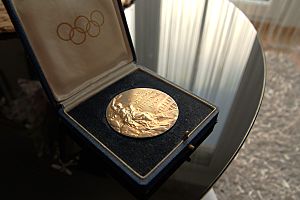Hungary national football team facts for kids
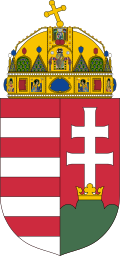 |
|||||||||||||||||||||||||||||||||||||||||||||||||||||||||||
| Nickname(s) | Magyarok (Magyars) Nemzeti Tizenegy (National Eleven) Trikólor (Tricolours) |
||||||||||||||||||||||||||||||||||||||||||||||||||||||||||
|---|---|---|---|---|---|---|---|---|---|---|---|---|---|---|---|---|---|---|---|---|---|---|---|---|---|---|---|---|---|---|---|---|---|---|---|---|---|---|---|---|---|---|---|---|---|---|---|---|---|---|---|---|---|---|---|---|---|---|---|
| Association | Magyar Labdarúgó Szövetség (MLSZ) | ||||||||||||||||||||||||||||||||||||||||||||||||||||||||||
| Confederation | UEFA (Europe) | ||||||||||||||||||||||||||||||||||||||||||||||||||||||||||
| Head coach | Marco Rossi | ||||||||||||||||||||||||||||||||||||||||||||||||||||||||||
| Captain | Dominik Szoboszlai | ||||||||||||||||||||||||||||||||||||||||||||||||||||||||||
| Most caps | Balázs Dzsudzsák (109) | ||||||||||||||||||||||||||||||||||||||||||||||||||||||||||
| Top scorer | Ferenc Puskás (84) | ||||||||||||||||||||||||||||||||||||||||||||||||||||||||||
| Home stadium | Puskás Aréna | ||||||||||||||||||||||||||||||||||||||||||||||||||||||||||
| FIFA code | HUN | ||||||||||||||||||||||||||||||||||||||||||||||||||||||||||
|
|||||||||||||||||||||||||||||||||||||||||||||||||||||||||||
| FIFA ranking | |||||||||||||||||||||||||||||||||||||||||||||||||||||||||||
| Current | 52 |
||||||||||||||||||||||||||||||||||||||||||||||||||||||||||
| Highest | 18 (April–May 2016) | ||||||||||||||||||||||||||||||||||||||||||||||||||||||||||
| Lowest | 87 (July 1996) | ||||||||||||||||||||||||||||||||||||||||||||||||||||||||||
| Elo ranking | |||||||||||||||||||||||||||||||||||||||||||||||||||||||||||
| Current | 57 |
||||||||||||||||||||||||||||||||||||||||||||||||||||||||||
| Highest | 1 (1953–57, 1958, 1964, 1965) | ||||||||||||||||||||||||||||||||||||||||||||||||||||||||||
| Lowest | 80 (November 2003) | ||||||||||||||||||||||||||||||||||||||||||||||||||||||||||
| First international | |||||||||||||||||||||||||||||||||||||||||||||||||||||||||||
| Script error: The function "fb" does not exist. 5–0 Script error: The function "fb-rt" does not exist. (Vienna, Austria; 12 October 1902) |
|||||||||||||||||||||||||||||||||||||||||||||||||||||||||||
| Biggest win | |||||||||||||||||||||||||||||||||||||||||||||||||||||||||||
| Script error: The function "fb" does not exist. 0–12 Script error: The function "fb-rt" does not exist. (Moscow, Russia; 14 July 1912) Script error: The function "fb" does not exist. 13–1 Script error: The function "fb-rt" does not exist. (Budapest, Hungary; 12 June 1927) Script error: The function "fb" does not exist. 12–0 Script error: The function "fb-rt" does not exist. (Budapest, Hungary; 24 September 1950) |
|||||||||||||||||||||||||||||||||||||||||||||||||||||||||||
| Biggest defeat | |||||||||||||||||||||||||||||||||||||||||||||||||||||||||||
| Script error: The function "fb" does not exist. 7–0 Script error: The function "fb-rt" does not exist. (Stockholm, Sweden; 30 June 1912) Script error: The function "fb" does not exist. 7–0 Script error: The function "fb-rt" does not exist. (Cologne, Germany; 6 April 1941) Script error: The function "fb" does not exist. 8–1 Script error: The function "fb-rt" does not exist. (Amsterdam, Netherlands; 11 October 2013) |
|||||||||||||||||||||||||||||||||||||||||||||||||||||||||||
| World Cup | |||||||||||||||||||||||||||||||||||||||||||||||||||||||||||
| Appearances | 9 (first in 1934) | ||||||||||||||||||||||||||||||||||||||||||||||||||||||||||
| Best result | Runners-up (1938, 1954) | ||||||||||||||||||||||||||||||||||||||||||||||||||||||||||
| European Championship | |||||||||||||||||||||||||||||||||||||||||||||||||||||||||||
| Appearances | 5 (first in 1964) | ||||||||||||||||||||||||||||||||||||||||||||||||||||||||||
| Best result | Third place (1964) | ||||||||||||||||||||||||||||||||||||||||||||||||||||||||||
|
Medal record
|
|||||||||||||||||||||||||||||||||||||||||||||||||||||||||||
The Hungary national football team, also known as the Magyarok (Magyars), represents Hungary in international men's football. The team is famous for its incredible football history, especially the legendary Golden Team of the 1950s. They have won three Olympic gold medals and have been runners-up in two FIFA World Cups. The team plays its home games at the modern Puskás Aréna in Budapest.
Hungary was a dominant force in world football. The Golden Team, led by the great Ferenc Puskás, changed how the game was played. They went unbeaten for 31 games over four years, a record at the time. One of their most famous wins was the "Match of the Century" in 1953, where they beat England 6-3 at Wembley Stadium.
After many years of not qualifying for big tournaments, Hungary has seen a comeback. They have played in the last three UEFA European Championships in 2016, 2020, and 2024. They also earned a spot in the top level of the UEFA Nations League.
Contents
A Legendary History
The Beginning
Hungary played its first international match against Austria in 1902. The team's first big tournament was the 1912 Summer Olympics in Stockholm, Sweden. In the 1920s, Hungary was known for using a special 2–3–5 formation, which was very attacking.
In 1927, Hungary beat France 13–1, which is still a record win for the team. They also reached the final of the Central European International Cup, an early tournament for European national teams.
The Amazing 'Golden Team'
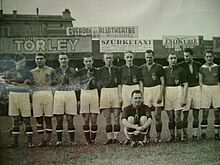
Hungary's first great success came at the 1938 FIFA World Cup in France. They played brilliantly and reached the final, where they lost to Italy. This team showed the world that Hungary was a top football nation.
The 1950s was the era of the Aranycsapat, or the Golden Team. This team is considered one of the best in football history. With amazing players like Ferenc Puskás, Sándor Kocsis, and Nándor Hidegkuti, they played a new, exciting style of football. For four years, from 1950 to 1954, they did not lose a single match for 31 games.
In 1952, they won the gold medal at the Summer Olympics in Helsinki. A year later, they shocked the world by beating England 6-3 at Wembley Stadium in London. England had never lost at home to a team from outside the British Isles before. This game is called the "Match of the Century."
At the 1954 FIFA World Cup, Hungary was the favorite to win. They scored an amazing 25 goals on their way to the final. In the final, they faced West Germany, a team they had already beaten 8-3 in the group stage. Hungary quickly went ahead 2-0, but West Germany made a surprising comeback to win 3-2. This match is known as "The Miracle of Bern."
The Golden Team's era ended after the Hungarian Revolution of 1956. Because of the difficult situation in the country, many star players, including Puskás, left Hungary and never played for the national team again.
More Success in the 1960s
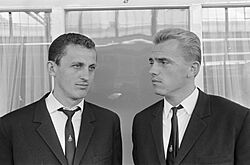
Even after the Golden Team, Hungary remained a strong football nation in the 1960s. They won two more Olympic gold medals in 1964 and 1968, and a bronze medal in 1960. This makes Hungary the most successful country in men's Olympic football history.
The team also did well in other tournaments. They finished third at the 1964 European Nations' Cup. At the 1966 FIFA World Cup in England, they famously beat Brazil and reached the quarter-finals. A new star, Flórián Albert, was named European Footballer of the Year in 1967.
A Time of Struggle
After 1972, when Hungary won a silver medal at the Olympics and finished fourth at the European Championship, the team began to struggle. They played in the 1978, 1982, and 1986 World Cups but could not get past the group stage. The 10-1 win against El Salvador in 1982 is still the biggest win in World Cup history.
After the 1986 World Cup, Hungary went through a very difficult period. For 30 years, the team failed to qualify for any major tournament. Many of the country's football clubs faced problems, which affected the national team.
A Modern Comeback
In the 2010s, things started to change for the better. A new generation of talented players began to emerge. The team finally returned to a major tournament by qualifying for UEFA Euro 2016. In France, they played very well, winning their group and reaching the round of 16.
This success continued, and Hungary qualified for UEFA Euro 2020 and UEFA Euro 2024. At Euro 2020, they were in a "group of death" with France, Germany, and Portugal. Even though they didn't advance, they earned draws against world champions France and Germany.
The team also impressed in the UEFA Nations League, beating England twice (including a 4-0 win away from home) and Germany. This showed that Hungary is once again a team that can compete with the best in Europe.
Team Identity
Rivalries
Hungary has a long football rivalry with its neighbor, Romania. Matches between the two countries are always very intense. Another historic rivalry is with Austria. The match between Austria and Hungary is the second most-played international game in football history.
Supporters
The team is cheered on by a famous fan group called the Carpathian Brigade. They are known for their passionate support and creating an exciting atmosphere at matches. With loud chants, huge flags, and colorful displays, they follow the team across Europe to show their support. Many fans also come from Hungarian communities in neighboring countries like Romania, Slovakia, and Serbia.
Kits and Crest
Hungary's traditional home kit is a red shirt, white shorts, and green socks. These colors represent the Hungarian flag. The team's crest is the Coat of arms of Hungary, which is worn over the heart. Unlike many teams that wear their football association's logo, Hungary has always worn the national coat of arms.
Home Stadium
Hungary plays its home matches at the Puskás Aréna in Budapest. The stadium is named after the legendary player Ferenc Puskás. It opened in 2019 and can hold over 67,000 fans.
The new stadium was built on the site of the old Ferenc Puskás Stadium, which was famous for hosting the 7-1 victory over England in 1954. The Puskás Aréna is one of the most modern stadiums in Europe and hosted matches during UEFA Euro 2020.
Results and Fixtures
Here is a list of recent and upcoming matches for the team.
2025
| 20 March UEFA Nations League Relegation Play-off | Script error: The function "fb-rt" does not exist. | 3–1 | Script error: The function "fb" does not exist. | Istanbul, Turkey |
| 20:00 TRT (UTC+03:00) | Stadium: Rams Park Attendance: 38,500 Referee: Ivan Kružliak (Slovakia) |
| 23 March UEFA Nations League Relegation Play-off | Script error: The function "fb-rt" does not exist. | 0–3 (1–6 agg.) |
Script error: The function "fb" does not exist. | Budapest, Hungary |
| 18:00 CET (UTC+01:00) |
|
Stadium: Puskás Aréna Attendance: 57,861 Referee: Felix Zwayer (Germany) |
| 6 June Friendly | Hungary |
0–2 | Script error: The function "fb" does not exist. | Budapest, Hungary |
| 19:30 CEST (UTC+02:00) | Stadium: Puskás Aréna Attendance: 55,000 Referee: Atilla Karaoglan (Turkey) |
| 10 June Friendly | Script error: The function "fb-rt" does not exist. | 1–2 | Script error: The function "fb" does not exist. | Baku, Azerbaijan |
| 20:00 AZT (UTC+04:00) | Stadium: Dalga Arena Attendance: 1,200 Referee: Viktor Shimusik (Belarus) |
| 6 September 2026 FIFA World Cup qualification | Script error: The function "fb-rt" does not exist. | v | Script error: The function "fb" does not exist. | Dublin, Ireland |
| 19:45 BST (UTC+01:00) | Stadium: Aviva Stadium |
| 9 September 2026 FIFA World Cup qualification | Script error: The function "fb-rt" does not exist. | v | Script error: The function "fb" does not exist. | Budapest, Hungary |
| 20:45 CEST (UTC+02:00) | Stadium: Puskás Aréna |
Players
Current squad
The following players were part of the squad for the friendly matches in June 2025.
| No. | Pos. | Player | Date of birth (age) | Caps | Goals | Club |
|---|---|---|---|---|---|---|
| 1 | GK | Dénes Dibusz | 16 November 1990 | 44 | 0 | |
| 12 | GK | Balázs Tóth | 4 September 1997 | 1 | 0 | |
| 22 | GK | Péter Szappanos | 14 November 1990 | 2 | 0 | |
|
|
||||||
| 2 | DF | Attila Osváth | 10 December 1995 | 2 | 0 | |
| 3 | DF | Botond Balogh | 6 June 2002 | 8 | 0 | |
| 4 | DF | Attila Mocsi | 29 May 2000 | 1 | 0 | |
| 5 | DF | Gábor Szalai | 9 June 2000 | 1 | 0 | |
| 6 | DF | Willi Orbán | 3 November 1992 | 58 | 6 | |
| 7 | DF | Loïc Négo | 15 January 1991 | 42 | 2 | |
| 15 | DF | Márton Dárdai | 12 February 2002 | 15 | 0 | |
|
|
||||||
| 8 | MF | Tamás Nikitscher | 3 November 1999 | 9 | 0 | |
| 10 | MF | Dominik Szoboszlai (captain) | 25 October 2000 | 55 | 16 | |
| 11 | MF | Milos Kerkez | 7 November 2003 | 23 | 0 | |
| 13 | MF | András Schäfer | 13 April 1999 | 37 | 4 | |
| 14 | MF | Bendegúz Bolla | 22 November 1999 | 28 | 0 | |
| 17 | MF | Callum Styles | 28 March 2000 | 24 | 0 | |
| 18 | MF | Zsolt Nagy | 25 May 1993 | 31 | 3 | |
| 21 | MF | Alex Tóth | 23 October 2005 | 3 | 0 | |
| 24 | MF | Bence Dárdai | 24 January 2006 | 3 | 0 | |
| 25 | MF | Áron Csongvai | 31 October 2000 | 2 | 0 | |
| 26 | MF | Milán Vitális | 28 January 2002 | 0 | 0 | |
|
|
||||||
| 16 | FW | Dániel Gazdag | 2 March 1996 | 30 | 4 | |
| 19 | FW | Barnabás Varga | 25 October 1994 | 23 | 8 | |
| 20 | FW | Roland Sallai (vice-captain) | 22 May 1997 | 60 | 14 | |
| 23 | FW | Kevin Csoboth | 20 June 2000 | 19 | 1 | |
Player Records
Players in bold are still active with the national team.
Most Appearances
| Rank | Player | Caps | Career |
|---|---|---|---|
| 1 | Balázs Dzsudzsák | 109 | 2007–2022 |
| 2 | Gábor Király | 108 | 1998–2016 |
| 3 | József Bozsik | 101 | 1947–1962 |
| 4 | Zoltán Gera | 97 | 2002–2017 |
| 5 | Roland Juhász | 95 | 2004–2016 |
| 6 | László Fazekas | 92 | 1968–1983 |
| 7 | Ádám Nagy | 88 | 2015–present |
| 8 | Gyula Grosics | 86 | 1947–1962 |
| Ádám Szalai | 86 | 2009–2022 | |
| 10 | Ferenc Puskás | 85 | 1945–1956 |
Top Goalscorers
| Rank | Player | Goals | Caps | Career |
|---|---|---|---|---|
| 1 | Ferenc Puskás | 84 | 85 | 1945–1956 |
| 2 | Sándor Kocsis | 75 | 68 | 1948–1956 |
| 3 | Imre Schlosser | 59 | 68 | 1906–1927 |
| 4 | Lajos Tichy | 51 | 72 | 1955–1971 |
| 5 | György Sárosi | 42 | 62 | 1931–1943 |
| 6 | Nándor Hidegkuti | 39 | 69 | 1945–1958 |
| 7 | Ferenc Bene | 36 | 76 | 1962–1979 |
| 8 | Gyula Zsengellér | 32 | 39 | 1936–1947 |
| Tibor Nyilasi | 32 | 70 | 1975–1985 | |
| 10 | Roland Sallai | 31 | 74 | 2016–present |
Competitive Record
FIFA World Cup
| FIFA World Cup record | |||||||||
|---|---|---|---|---|---|---|---|---|---|
| Year | Round | Position | Pld | W | D | L | GF | GA | Squad |
| Did not enter | |||||||||
| Quarter-finals | 6th | 2 | 1 | 0 | 1 | 5 | 4 | Squad | |
| Runners-up | 2nd | 4 | 3 | 0 | 1 | 15 | 5 | Squad | |
| Did not enter | |||||||||
| Runners-up | 2nd | 5 | 4 | 0 | 1 | 27 | 10 | Squad | |
| Group stage | 10th | 4 | 1 | 1 | 2 | 7 | 5 | Squad | |
| Quarter-finals | 5th | 4 | 2 | 1 | 1 | 8 | 3 | Squad | |
| 6th | 4 | 2 | 0 | 2 | 8 | 7 | Squad | ||
| Did not qualify | |||||||||
| Group stage | 15th | 3 | 0 | 0 | 3 | 3 | 8 | Squad | |
| 14th | 3 | 1 | 1 | 1 | 12 | 6 | Squad | ||
| 18th | 3 | 1 | 0 | 2 | 2 | 9 | Squad | ||
| Did not qualify | |||||||||
| To be determined | |||||||||
| Total | Runners-up | 9/23 | 32 | 15 | 3 | 14 | 87 | 57 | — |
UEFA European Championship
| UEFA European Championship record | |||||||||
|---|---|---|---|---|---|---|---|---|---|
| Year | Round | Position | Pld | W | D | L | GF | GA | Squad |
| Did not qualify | |||||||||
| Third place | 3rd | 2 | 1 | 0 | 1 | 4 | 3 | Squad | |
| Did not qualify | |||||||||
| Fourth place | 4th | 2 | 0 | 0 | 2 | 1 | 3 | Squad | |
| Did not qualify | |||||||||
| Round of 16 | 13th | 4 | 1 | 2 | 1 | 6 | 8 | Squad | |
| Group stage | 20th | 3 | 0 | 2 | 1 | 3 | 6 | Squad | |
| 18th | 3 | 1 | 0 | 2 | 2 | 5 | Squad | ||
| To be determined | |||||||||
| Total | Third place | 5/17 | 14 | 3 | 4 | 7 | 16 | 25 | — |
Olympic Games
Football at the Olympics was for senior national teams until 1988. Now it is a tournament for players under 23 years old.
| Summer Olympics record (Senior Team Era) | ||||||||||
|---|---|---|---|---|---|---|---|---|---|---|
| Year | Host | Round | Position | Pld | W | D | L | GF | GA | Squad |
| 1912 | Round 2 | 10th | 1 | 0 | 0 | 1 | 0 | 7 | Squad | |
| 1924 | Round 2 | 9th | 2 | 1 | 0 | 1 | 5 | 3 | Squad | |
| 1936 | Round 1 | 13th | 1 | 0 | 0 | 1 | 0 | 3 | Squad | |
| 1952 | Gold medalists | 1st | 6 | 6 | 0 | 0 | 20 | 2 | Squad | |
| 1960 | Bronze medalists | 3rd | 5 | 4 | 0 | 1 | 17 | 9 | Squad | |
| 1964 | Gold medalists | 1st | 5 | 5 | 0 | 0 | 22 | 6 | Squad | |
| 1968 | Gold medalists | 1st | 5 | 5 | 1 | 0 | 18 | 3 | Squad | |
| 1972 | Silver medalists | 2nd | 7 | 5 | 1 | 1 | 21 | 5 | Squad | |
| Total | 3 Gold medals | 8 Appearances | 32 | 26 | 2 | 5 | 103 | 38 | — | |
Honours
Major competitions
Regional
- Balkan Cup
- Champions (1): 1947
- Central European International Cup
- Champions (1): 1948–53
See also
 In Spanish: Selección de fútbol de Hungría para niños
In Spanish: Selección de fútbol de Hungría para niños
- Austria–Hungary football rivalry
- Hungary men's national under-17 football team
- Hungary men's national under-19 football team
- Hungary men's national under-21 football team
- Hungary-Romania football rivalry
- Hungary women's national football team
 | Jackie Robinson |
 | Jack Johnson |
 | Althea Gibson |
 | Arthur Ashe |
 | Muhammad Ali |


